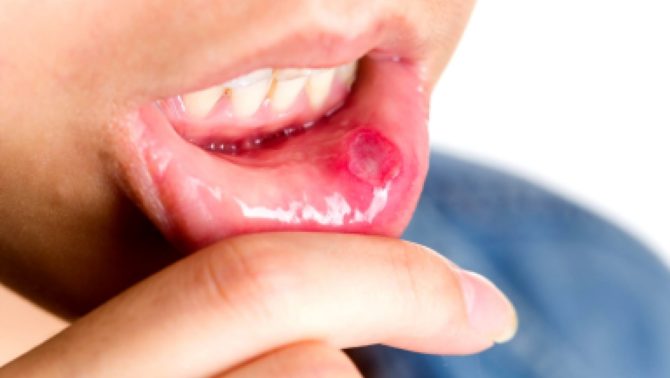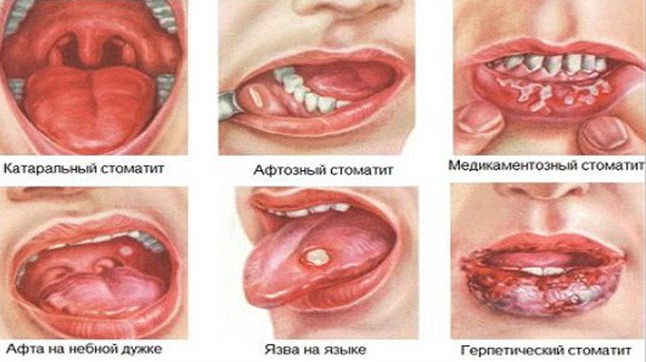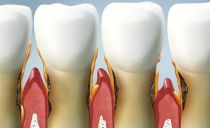How and how to quickly cure stomatitis in the mouth in adults at home
A painful and unpleasant oral disease called stomatitis is known to almost everyone. Most often, people are interested in how to get rid of it as soon as possible without resorting to the help of doctors. With a competent approach, stomatitis in the mouth can be quickly cured at home., for this you need to know all the features of an annoying sore.
Content
Why does the disease develop?
Despite the fact that stomatitis is more common in children, there are a number of reasons why this disease can affect adults. As a result, adults get sick no less than children, and every year cases of the disease in adults are observed more often. This is facilitated by many factors, ranging from poor ecology and ending with general weakened immunity in all segments of the population.
Until the end, the etiology of stomatitis has not been clarified by medicine, because any person in the oral cavity has a huge number of various microbes, bacteria, viruses, mycoplasmas that coexist with a person without violating his general health. But at some point, some kind of malfunction occurs in the vital system, and microorganisms that are not controlled by immunity begin to multiply actively, causing inflammation of the oral mucous membranes - stomatitis.
The following factors can provoke stomatitis:
- Traumatic damage to the mucous membrane in the oral cavity - a chemical or thermal burn, as well as any mechanical effects (scratches, punctures, cuts, bites). Typically, small wounds heal quickly, and larger ones under adverse conditions can lead to the progression of the disease.
- Problems with prosthetics. Poor quality, poor installation or improper care of the dentures.
- Unbalanced and malnutrition, especially complicated by vitamin deficiency.
- Allergic reactions to drugs, toothpastes, products.
- Negative habits - smoking, drugs, alcohol.
- Poor oral health - caries, periodontitis, erosion, broken teeth, ulcers.
- Inadequate oral care and neglect of general hygiene.
- Weakened immunity and infection with infectious diseases - scarlet fever, smallpox, measles, flu.
- Any other side diseases - oncology, HIV, diabetes, asthma, anemia, hormonal imbalance, disorders of the digestive tract, thyroid gland, cardiovascular system and other serious illnesses.
Due to such a large number of factors, it is very difficult to determine for yourself what exactly caused the development of stomatitis, therefore, with serious inflammation of the oral mucosa, it is advisable to consult a doctor. If this option is unacceptable, then in order to fight stomatitis correctly, you need to understand the types of disease, because there are a lot of them, they have completely different symptoms, methods of infection, pathogens and treatment methods.
What are the types of disease
The first thing to consider when treating is There are two forms of stomatitis - acute and relapsing or chronic. The course and duration of the disease, its symptoms, as well as the reaction of the pathogen of the inflammatory process to medications and the possibility of a quick cure depend on the form of stomatitis.
The acute form of the disease has pronounced symptoms, but is easier to treat. And recurrent inflammation sometimes passes almost imperceptibly, but it is very difficult to completely get rid of it.
To prevent the disease from moving from an acute form to a chronic one, it is advisable to start treating stomatitis in the mouth at home after consulting a dentist and as soon as possible after the onset of the first symptoms.
Depending on the provoking factors and pathogens of the disease, there are several types of stomatitis. The main varieties are:
- bacterial or traumatic;
- viral;
- fungal;
- aphthous;
- allergic
Bacterial or traumatic form
These two types of diseases of the oral cavity are often combined in one form, because the causes of their occurrence are interrelated. As a result of trauma to the mucous membrane, poor teeth condition and non-compliance with hygiene procedures, bacteria get into the tissue through cuts, scratches and cracks, where their active reproduction begins.
In order to quickly cure bacterial or traumatic stomatitis at home, you first need to exclude the damaging factor: diseased or broken teeth, failed crowns, hot, spicy, acidic foods - and then fight bacteria.
The following bacteria can cause this sore: staphylococcus, streptococcus, spindle-shaped bacillus, spirochete. The inflammatory process itself is divided into two types - catarrhal or superficial and ulcerative or deep.
Catarrhal (superficial) stomatitis
Superficial stomatitis is the mildest form of inflammation of the oral mucosa. This is just the kind of stomatitis that can be easily treated at home - normal mouthwashes and dieting are enough.
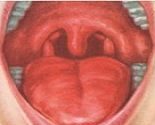 Catarrhal stomatitis usually goes away without general signs of malaise, characterized only by local manifestation. The main symptoms of the disease:
Catarrhal stomatitis usually goes away without general signs of malaise, characterized only by local manifestation. The main symptoms of the disease:
- swelling and redness of the mucosa;
- splicing and desquamation of superficial epithelial layers;
- dry and bleeding gums;
- severe pain during eating and talking;
- putrid breath.
Ulcerative (deep) stomatitis
This form of the disease is also called Vincent’s ulcerative necrotic stomatitis. This is a very serious type of lesion, which can be both a complication of the catarrhal form of the disease with insufficient treatment, and an independent disease.
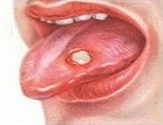 In addition to strong local manifestations, the disease proceeds against the background of a significant general malaise. The first group of symptoms includes: lack of mobility of the tongue, very painful sensations in the mouth, a large amount of plaque of a gray tint, disgusting “darling” during a conversation. The second group of symptoms includes fever, headaches, swollen lymph nodes, weakness, and aching joints. With such symptoms, treating stomatitis at home is strictly contraindicated, it is necessary to consult a doctor.
In addition to strong local manifestations, the disease proceeds against the background of a significant general malaise. The first group of symptoms includes: lack of mobility of the tongue, very painful sensations in the mouth, a large amount of plaque of a gray tint, disgusting “darling” during a conversation. The second group of symptoms includes fever, headaches, swollen lymph nodes, weakness, and aching joints. With such symptoms, treating stomatitis at home is strictly contraindicated, it is necessary to consult a doctor.
Viral infection
There are several types of stomatitis that are caused by different viruses, including infectious diseases such as chickenpox, measles, scarlet fever, and flu. But the main types of viral dental infection are:
- Enterovirus form of the disease. It is caused by enteroviruses, it is rare in adults, children are mostly ill.
- The vesicular form of the disease. Caused by viruses from the genus Vesiculorus. A rare disease that agricultural workers most often suffer from, as pathogens parasitize in cattle.
- Herpetic form of the disease. It is caused by the herpes virus and is the most common type of viral disease of the oral cavity.
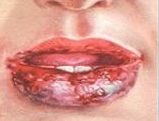 Herpetic stomatitis differs only in local manifestation without general malaise, although with an advanced disease, fever and other generalized painful conditions are possible. With this form of an ailment in the oral cavity, rashes of a bubble form characteristic of herpes on the lip appear, which subsequently open and transform into painful sores. Such pustules concentrate on the tonsils, tongue, inner surface of the cheeks and lip. Herpetic stomatitis in adults is usually easy to treat quickly.
Herpetic stomatitis differs only in local manifestation without general malaise, although with an advanced disease, fever and other generalized painful conditions are possible. With this form of an ailment in the oral cavity, rashes of a bubble form characteristic of herpes on the lip appear, which subsequently open and transform into painful sores. Such pustules concentrate on the tonsils, tongue, inner surface of the cheeks and lip. Herpetic stomatitis in adults is usually easy to treat quickly.
Fungal disease of the oral cavity
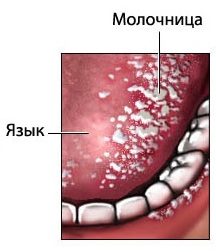 To fungal disease include candidal stomatitis, which is also called thrush. Inflammation of the mucous membrane causes the yeast-like fungus Candida. Among the adult population, this disease is most susceptible to the elderly, as well as patients with severe chronic ailments, in which there is a significant decrease in immunity.
To fungal disease include candidal stomatitis, which is also called thrush. Inflammation of the mucous membrane causes the yeast-like fungus Candida. Among the adult population, this disease is most susceptible to the elderly, as well as patients with severe chronic ailments, in which there is a significant decrease in immunity.
If you suspect a thrush, it is not recommended to treat stomatitis at home, it is better to consult a doctor, since candidiasis can be a sign of a serious systemic pathology.
The sore has the following main symptoms:
- burning in the oral cavity, starting with the larynx;
- white curd on the mucous membrane of the mouth and bleeding when it is removed;
- unpleasant metallic taste, and sometimes even loss of taste perception;
- there may be a general malaise associated with the occurrence of an internal ailment, which causes inflammation in the mouth.
Aphthous type of inflammation
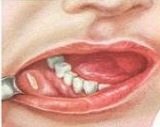 Aphthous stomatitis is still poorly understood. The nature of its occurrence is still completely incomprehensible; various options are suggested: from a genetic predisposition and allergic reactions, to systemic somatic diseases and viral infection.
Aphthous stomatitis is still poorly understood. The nature of its occurrence is still completely incomprehensible; various options are suggested: from a genetic predisposition and allergic reactions, to systemic somatic diseases and viral infection.
Symptoms of sores include:
- the appearance of aphthae in the oral cavity - roundish bright red ulcers with clearly defined borders and a grayish bloom in the center;
- pain in contact with erosion;
- general malaise.
Aphthous stomatitis can be cured at home, but it is advisable to do this under the supervision of a doctor, since this type of ailment easily becomes chronic.
What medications can help cure stomatitis at home
Quickly cure stomatitis in the mouth is possible only with the help of correctly selected medicines. They can be used at home, the main thing is to know which medication is suitable for the treatment of a certain type of disease:
- The catarrhal form of the disease does not require medical treatment, it will be enough to rinse your mouth and throat with ordinary hydrogen peroxide or soda for several days. First, the funds must be diluted with water. Until a complete recovery, you should follow a sparing diet and take vitamins. If the sore does not pass for a long time, antibacterial agents for topical use will help: solutions, aerosols, sprays.
- Manifestations of the herpetic form of the disease are removed using an integrated approach. Antiherpetic, antihistamine and antiviral drugs, both internal and external, will be needed. You need to drink pills, rinse your mouth, spray ulcers with aerosol, lubricate the wounds with ointments several times a day.
- To combat thrush, antifungal, antihistamines and regenerating drugs are used, most often topical for external use, but drugs in tablet form are also acceptable.
- Anti-inflammatory, antihistamines and healing agents help get rid of aphthous stomatitis. With this sore, it is recommended to rinse the oral cavity thoroughly every day.
As an additional therapy for all types of dental disease, it is necessary to drink painkillers, immunostimulants and vitamin complexes.
For the treatment of this disease, not only medications are used, with a mild form of the disease, you can try to get rid of stomatitis at home with the help of folk remedies.
How to treat stomatitis in the mouth in adults at home with folk remedies
There are many alternative methods that have been used for years to combat inflammation of the oral mucosa. They are quite effective and help a lot. Useful components of "eternal recipes" have pronounced healing properties. Therefore, if it is not possible to use medications, you can successfully treat stomatitis with home remedies:
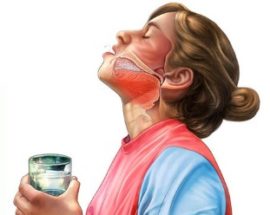 Solutions of soda, hydrogen peroxide and propolis tinctures. It will take only 1 teaspoon of one of the components per glass of water for a single use. The solution needs to rinse the oral cavity to achieve a cleansing, anti-inflammatory and healing effect.
Solutions of soda, hydrogen peroxide and propolis tinctures. It will take only 1 teaspoon of one of the components per glass of water for a single use. The solution needs to rinse the oral cavity to achieve a cleansing, anti-inflammatory and healing effect.- The healing properties of aloe, garlic, raw potatoes will help cleanse the mouth from ulcers. They are crushed and made slurry, which is applied to the affected areas. To soften, you can add sour cream to garlic, olive oil to potatoes. Aloe can be replaced by Kalanchoe.
- You can remove inflammation with the help of infusion of chamomile, sage or oak bark. It’s not hard to do them, just brew the medicinal herb and insist for 30 minutes. The resulting broth is used in a warm form for rinsing.
- Quickly remove erosion and bacteria ordinary iodine or brilliant green. Ulcers can be easily treated if they are lubricated with one of the indicated remedies.
Knowing all the subtleties of the disease and ways to combat it, stomatitis can easily be cured at home independently. But you need to take into account the fact that all of the above applies only to adults, not children, because not all methods are suitable for the treatment of childhood inflammation. The baby’s mouth is completely unsuitable for some aggressive agents - the same peroxide, propolis alcohol infusion or garlic cannot be used to combat ulcers in childhood.

